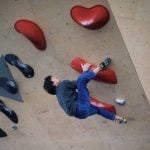
A couple weeks ago, Dr. Eugen Burtscher and Dr. Volker Schöffl (@volkerschoeffl) made headlines when they resigned from their volunteer positions on the IFSC’s Medical Commission. Dr. Burtscher served as the Chair of the Commission, and Dr. Schöffl was a Commission member for more than a decade. Following their resignations, a lengthy post on Dr. Schöffl’s Instagram page cited repeated “non-action” on the part of the IFSC to “detect, evaluate and help” athletes with disordered eating. “The current politics with regards to RED-S cannot be accepted,” the Instagram post stated, specifically referencing the broad condition of Relative Energy Deficiency in Sport (RED-S). In this episode of the CBJ Podcast, Dr. Schöffl provides further background on his resignation, explains more about RED-S and its potential dire consequences, and offers some ideas and directions for possible solutions to the complex topic of disordered eating in climbing.
Thank you Devin Dabney for your music!
Timestamps
00:00 – Intro/background
05:15 – What is RED-S?
12:27 – Is RED-S a secret in climbing?
16:53 – What is the pushback to more elaborate screening?
20:54 – Dr. Shöffl’s resignation process
24:50 – Response to the resignations
29:29 – How can the problem be solved?
31:42 – Responsibility at all levels
34:32 – Closing
Abridged Transcript
BURGMAN: It seems to me like RED-S is a pretty broad condition and pretty obvious in some ways. If you don’t eat enough, you won’t have enough energy. However, what becomes more concerning and more serious are some of the specific things that can happen as a result of RED-S: frequent stomach aches, sometimes quite severe stomach aches; frequent sickness in general because the body has a harder time fighting off viruses, infections, colds and whatnot; general weakness; loss of strength and muscle tone; disrupted or halted menstrual cycles. There’s a long list of potential complications from RED-S. But I want to throw it to you…Am I on the right track here?
DR SCHÖFFL: …Yes, you got it right, but you are mostly reporting on the harmless symptoms. Where can RED-S lead to? There’s one clear answer, and that’s death. And I’ve seen that. I lost not a climber but a ski-mountaineer, a patient. I was involved with the initial diagnosis of it, and unfortunately we lost this person due to his anorexia athletica at the end due to RED-S or RED Syndrome. Also, we have a lot of other very serious conditions. While a young woman may not be shy about or not be unhappy while she’s not menstruating, because it may reduce a lot of problems in the current status during a World Cup competition series, it can cause a lot of long-term harm, like bone mineral density is diminished, they have fatigue fractures, they have longtime consequences.
I have been doing climbing medicine since 30 years, and since that time frame I’m always having patients with the disease anorexia athletica. And those people don’t go away; they stay. I see them again and again in my outpatient clinic as an orthopedic specialist and sports medical doctor. They come in their age of 40 and 50, and they have already two hip replacements because of fatigue fractures, and they have another fatigue fracture in their feet or anything. So, the long-term consequences are devastating. And we are not even speaking yet about the mental consequences. In general, pediatric doctors and psychologists say anorexia in a young female athlete or in a young female person can only be cured within a time frame of the first two initial years. Then it’s kind of more burned into the hard drive in your brain and you can only try to cope with the symptoms, but you can’t really cure a person anymore. It is still the highest death probability disease in young women. So, we’re talking about a very serious condition. Why would we just look at athletes who obviously are having these problems and not try to help them? I think this is our innermost duty, especially as sports medical doctors who are involved and are there for the well-being of our patients…

So, what is going on here? Are the athletes really good at hiding this? Or, are many people just choosing to ignore this problem and it is kind of a “dirty little secret”?
I don’t think it’s a dirty little secret because, since I am involved with climbing, there were always people openly reporting about their eating disorder already in the late 90s, and we know we have this problem. Nevertheless, I think there’s a lot of denial in the public opinion because we are just fascinated by what [the athletes] can do; we are fascinated by their results. Well, what they actually do is they do a legal kind of doping. They just hunger for success.
Maybe our perception also is so much driven to the point that we think a good climber needs to be super skinny and lean. But obviously there are also skinny and lean climbers who are completely healthy…That is so important and there’s a lot of misjudgment and misunderstanding in the Internet and the community. From the Medical Commission, we don’t want a minimum BMI or MI—MI is the mass index, which is more fair for lean people—to actually ban people from taking part. That’s never the case. It was shown like that on the IFSC webpage, but this was not the statement of the Medical Commission. That was done by the IFSC. We want to use that as a filter into which [athlete cases] we need to look more thoroughly—from which athletes we ask for a psychiatric/psychological evaluation, we ask for the standard nutritional/sports nutritional questionnaires. We would need a bone mineral density measurement. We would need sports medical exams, lab results, etc. And then we could come to a conclusion: Is there a medical condition, or is this just a healthy skinny person? …
What is the pushback to that more elaborate filter system that you just described? Is it a cost component?
…So, actually the IFSC would not be in charge of those expenses, but somebody would need to do the measurements. We did them all in our spare time last year, the Medical Commission. We told the IFSC we could not do it this year anymore; they should employ somebody who would travel around and actually measure the athletes. And they promised us in the beginning of the year that they’re going to have a strict regimen for 2023 implemented, but they never proceeded and never did anything. So, this year we developed screening parameters, BMI/MI, and then in collaboration with the IOC Medical Commission—who has a new RED-S regimen—we adopted that [system] onto climbing. So, we would claim and ask for certain medical information and data of the respective athlete and then we could gratify that [information] in accordance to our system. Then, at the end, we would have an area like green and orange or red area for the athlete: green would be fine to go; orange would be fine to go, but medical observations necessary; and red would be a red light…And it was always delayed by further questions and questioning back and non-medical people getting involved from the IFSC and having their own opinion; they were never taking it any further…

When you announced your resignation, did you receive any sort of messages from people [on the international comp scene]?
Absolutely, but that was mostly on the doctoral level from my colleagues there…who are absolutely understanding and supporting why we would step down. Also, from my non-medical but federation colleagues from Germany, from other federations, a lot from coaches. I do a lot of climbing medicine. I have two or three books out there; Climbing Medicine is a textbook on climbing medicine. So, I have a lot of friends in the scene. They all got back to me. What was really good was that actually we got noticed also out of the sport. Like, for example, the doctor of the German Track and Field Sports Association told me, “Yes, that’s a great step, I honor the step. And you would actually or you’re actually helping our sport as well, taking notice onto the condition.”
And the point is also, which I need to stress, we resigned not only because of frustration. One point is frustration because nothing’s happened. But I cannot take any responsibility anymore, and I don’t want to take any responsibility anymore to have my name affiliated with an organization like the IFSC who doesn’t do anything in that behalf for their athletes. When I’m at the World Cup, I speak with athletes, coaches and medical doctors from other associations, and they all ask, “We have the situation; it’s getting worse. Why don’t you do anything?” And it’s not the point that we don’t do anything; we do a lot. It’s just that, over the years, it’s all pointless.

Tell me how an ideal solution is achieved here because, I’ll say this, I think that there are kind of two challenges: One is the issue of detecting RED-S at the competition level, but then on the other hand changing or improving maybe the culture of climbing, right? And those are kind of two separate issues.
Changing the culture in climbing is what you are already doing. Talking about it, posting about it, reading and writing about it. That may change the culture…I think in climbing we as climbers need to get away from this mindset that you need to be a super skinny [person] and favorite that and celebrate that. For the reigning body of the IFSC, I think there must be a lot of external pressure onto them. It’s not only the Medical Commission or me. The Athletes Commission has the same opinion as us; the Athlete’s Commission was always on board. They want sanctions. They ask us, “Please measure. Why don’t you measure? Can you come and measure at the next World Cup? We want you to measure.” These are words from athletes of the Athletes Commission…And coaches approach us all the time, saying, “You’ve got to do something.” So, there must be a lot of pressure onto the IFSC until they are forced to do something.
















